Last summer, nearly half of the teams in La Liga changed their coach. There has been much less turnover this time around, but the four clubs in need of new coaches have quickly moved to fill those positions. Unless there are any unexpected changes between now and the start of the campaign, 17 of the 20 coaches next season will be Spanish, alongside two Argentinians (Diego Simeone and Mauricio Pellegrino) and a Frenchman (Zinedine Zidane) who spent good chunks of their playing careers in La Liga. It is the most homogenous of the big-five leagues in that regard. That isn’t to say that everyone employs the same approach. There are unique cases like Eibar’s mix of direct attacks and supreme shot suppression, and Getafe, with their aggressive mid-block, breaking up play and then quickly moving forwards. But it is often the same names rotating through positions. Four Spanish coaches have left the roles they held at the end of last season, and in their place have come four more Spanish coaches, three of whom coached other sides in La Liga at some point during the recently concluded campaign. (Espanyol elected to promote David Gallego from their B team).
Sevilla - Julen Lopetegui
Sevilla held a top-four position through the first half of last season, only to tail off thereafter and eventually end up sixth. Their decision to part ways with Pablo Machín in mid-March following what appeared to just be an unfortunate run of results was pretty questionable; Joaquín Caparros certainly didn’t inspire any sort of significant turnaround thereafter. Sporting director Monchi is back at the helm following his spell with Roma, and his first major decision was to appoint former Spain and Real Madrid coach Julen Lopetegui. It was a brave one. The stigma surrounding the manner in which Lopetegui’s time as national team coach came to an end immediately creates mistrust. Despite an initial press conference in which he hit all the right notes -- putting down city rivals Real Betis, praising the atmosphere at the club’s Sánchez Pizjuán stadium -- his reception has been lukewarm, at best. Neither does his record during his coaching career to date necessarily suggest that he is worth the negativity that surrounds him. He did good work with Spain (although the toughest competitive fixture he faced was the worst Italy side in some time, and he didn’t confront a tournament -- the time when a national team coach can have the most influence over their team) but the longest he has ever lasted in a club job is a season and a half at Porto. His first, at Rayo Vallecano, way back in 2003-04, ended after just 10 matches (six of which were defeats); his last, at Real Madrid last season, saw him sacked at the end of October following one of the club’s worst ever starts to a league campaign, and with an overall record of six wins, two draws and six defeats in 14 matches. There were certainly other issues at Madrid, many of which they are seeking to rectify with this summer’s spending spree, and his underlying numbers do suggest that they performed okay under his command. His were much better than those of his inexperienced successor Santiago Solari, and very marginally better than those of Zidane down the final stretch. 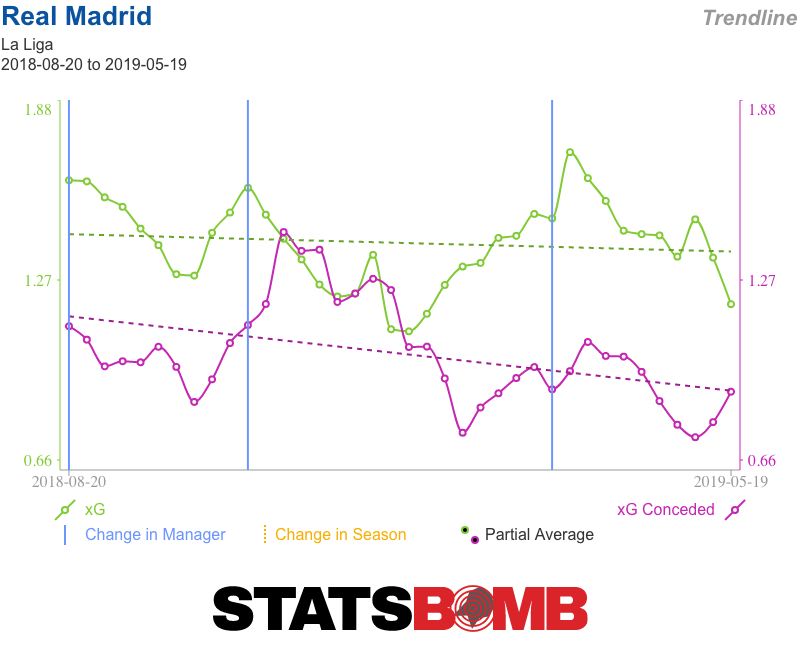 Perhaps I just can’t quite get over the similarity he bears to a flustered Angus Deayton, but on a subjective level, there is just something a bit unconvincing about Lopetegui and his work. There is likely to be a fair amount of turnover in the Sevilla squad this summer, and maybe everything will come together. Just colour me sceptical.
Perhaps I just can’t quite get over the similarity he bears to a flustered Angus Deayton, but on a subjective level, there is just something a bit unconvincing about Lopetegui and his work. There is likely to be a fair amount of turnover in the Sevilla squad this summer, and maybe everything will come together. Just colour me sceptical.
Real Betis - Rubi
Across town, there has also been a change in the dugout at Real Betis. Quique Setién provided attractive, possession-based football and had backers within the directorship, but the increasingly negative reception he received from the club’s supporters created an awkward environment for him and the players and eventually became untenable. The initial suggestion was that the club would look for a coach with a similar approach, but finding one would have been difficult. In the big-five leagues, only Barcelona, Bayern Munich, Paris Saint-Germain, Manchester City and Chelsea held a higher average share of possession than Betis last season, and in terms of the zones in which they attempted and completed passes, the only team who came especially close to their style were Bayer Leverkusen under Peter Bosz. Setién’s replacement Rubi does arrive off the back of two impressive campaigns. Two seasons ago, he led Huesca to their first-ever promotion to the top flight; last season, he steered Espanyol to a seventh-place finish, three points and three places ahead of Betis. In doing so, he secured them European qualification for the first time in over a decade. If Setién’s style was often characterised by his detractors as possession for possession’s sake, Rubi’s could be described as possession with purpose. Espanyol were capable of combining neat buildup play with swift and incisive counter-attacks when opportunities presented themselves. Like Betis, they generally sought to work the ball along the ground into the penalty area rather than swing in crosses. While they were marginally out shot (12.18 for; 13.05 against), they combined the fifth best shot quality in the division with the sixth lowest shot quality against for an overall positive expected goal difference (xGD) of 0.05 per match -- eighth best in the league, and 0.03 per match better than a Betis side with nearly twice their budget. 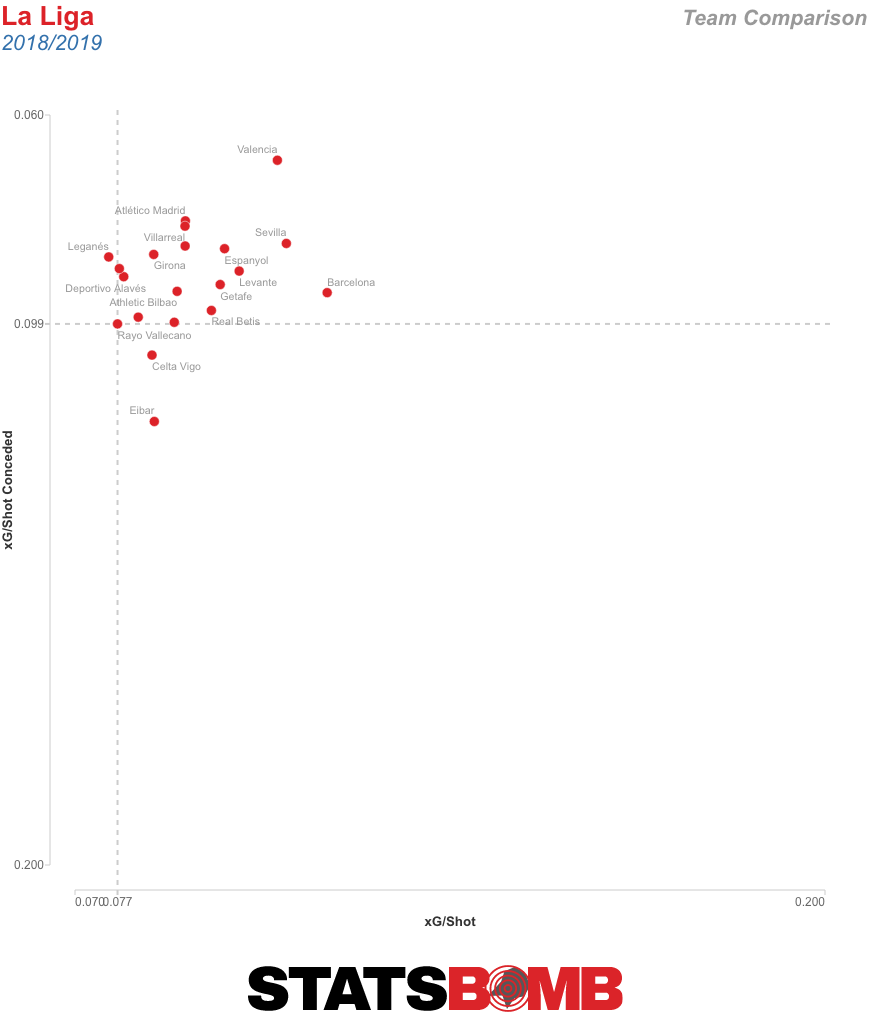 If there was one red mark against Rubi, it was that Espanyol were one of the worst teams at defending set-pieces in the league, ranking in the worst three in terms of both set piece xG (0.25 per match) and set piece goals (0.42 per match) conceded. With significant money likely to arrive from the sale of Giovani Lo Celso, there will be funds to reshape and improve the Betis squad, but it is already one that looks largely suited to Rubi’s approach. Without European football to stretch resources, a top-eight finish should be the minimum expectation.
If there was one red mark against Rubi, it was that Espanyol were one of the worst teams at defending set-pieces in the league, ranking in the worst three in terms of both set piece xG (0.25 per match) and set piece goals (0.42 per match) conceded. With significant money likely to arrive from the sale of Giovani Lo Celso, there will be funds to reshape and improve the Betis squad, but it is already one that looks largely suited to Rubi’s approach. Without European football to stretch resources, a top-eight finish should be the minimum expectation.
Alavés - Asier Garitano
Ten weeks into last season, Alavés were riding high in second in La Liga. For a long time, they looked on course for European qualification. They were as high as fifth as far into the campaign as matchday 28. But things derailed thereafter. They picked up just six points from their final 10 matches to end up 11th. Theirs was the typical tale of a side vastly outperforming their underlying numbers early on, only to later come back down to earth. 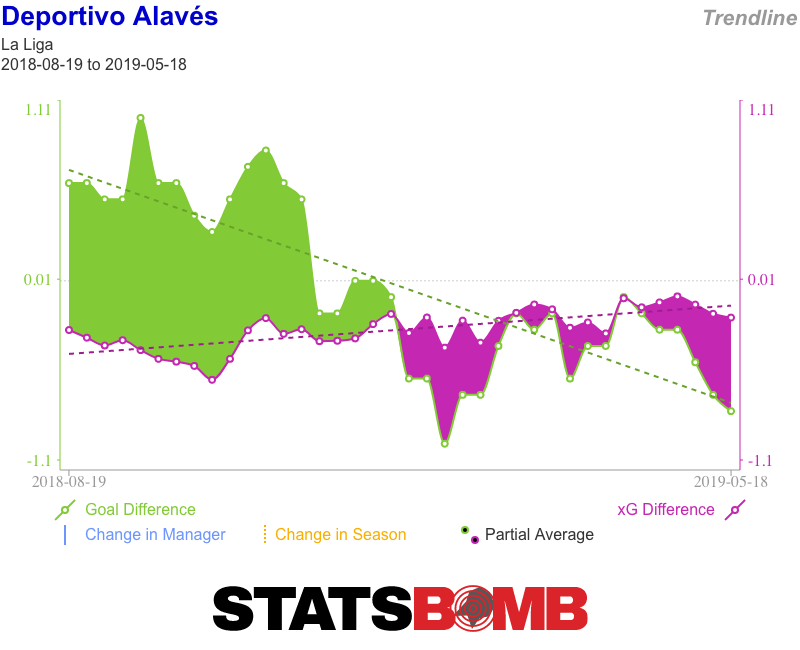 In April, it was announced that coach Abelardo would depart at the end of the season after failing to agree a new contract (“He asked for more than double what he was making this season,” was the explanation of the club’s majority shareholder Josean Querejeta). His replacement Asier Garitano spent the first half of last season at Real Sociedad, before being sacked over the Christmas break. Under him, La Real were marginally better in terms of xGD than under his successor Imanol Alguacil (0.03 per match vs. -0.03 per match), and it felt as if he deserved a little more time to get things right. In the 2017-18 season, at Leganés, his side finished 17th (albeit a full 16 points clear of the bottom three) but actually had the 11th best xGD in the division, with the 13th best attack and the sixth best defence. They tried to keep things tight; their matches averaged the third least number of shots in the league (22.16) and the fifth least xG (2.01). Garitano also looks a good stylistic choice for Alavés. His Leganés side were basically a better version of last season’s Alavés, particularly so in defence.
In April, it was announced that coach Abelardo would depart at the end of the season after failing to agree a new contract (“He asked for more than double what he was making this season,” was the explanation of the club’s majority shareholder Josean Querejeta). His replacement Asier Garitano spent the first half of last season at Real Sociedad, before being sacked over the Christmas break. Under him, La Real were marginally better in terms of xGD than under his successor Imanol Alguacil (0.03 per match vs. -0.03 per match), and it felt as if he deserved a little more time to get things right. In the 2017-18 season, at Leganés, his side finished 17th (albeit a full 16 points clear of the bottom three) but actually had the 11th best xGD in the division, with the 13th best attack and the sixth best defence. They tried to keep things tight; their matches averaged the third least number of shots in the league (22.16) and the fifth least xG (2.01). Garitano also looks a good stylistic choice for Alavés. His Leganés side were basically a better version of last season’s Alavés, particularly so in defence. 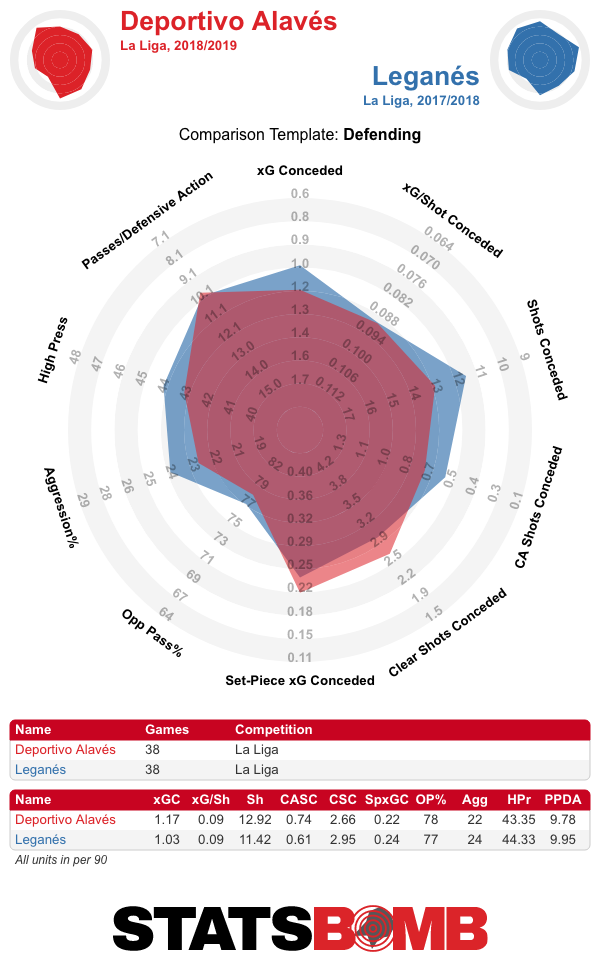 Garitano is taking over a side who had the fourth worst underlying numbers in the league. It won’t be an easy task, particularly with expectations raised by the last season’s high points. But if the club can recruit well over the summer, he looks like a good fit to put them solidly in mid-table.
Garitano is taking over a side who had the fourth worst underlying numbers in the league. It won’t be an easy task, particularly with expectations raised by the last season’s high points. But if the club can recruit well over the summer, he looks like a good fit to put them solidly in mid-table.
Celta Vigo and Villarreal - Sticking not twisting
Celta Vigo and Villarreal both performed way below expectations last season, finishing 17th and 14th respectively. Both teams changed their coach twice during the season, and both have elected to continue into 2019-20 with the coaches who finished the campaign. Celta Vigo were genuinely bad last season. They were the league’s second worst team in terms of xGD, with the seventh worst attack (0.96xG per match) and second worst defence (1.30xG conceded per match). Things might have been different had they had Iago Aspas fit and available for more of the campaign; as it was, they were fortunate to avoid the drop. The decision to keep Fran Escribá in charge for next season does, at least, have some solid basis in the underlying numbers. Of their three permanent, or "permanent" coaches, he had the best xGD per match, at -0.21, compared to -0.33 under Antonio Mohamed and a ghastly -0.52 under Miguel Cardoso (a rate that would have been comfortably the worst in La Liga if extended over the entire campaign). 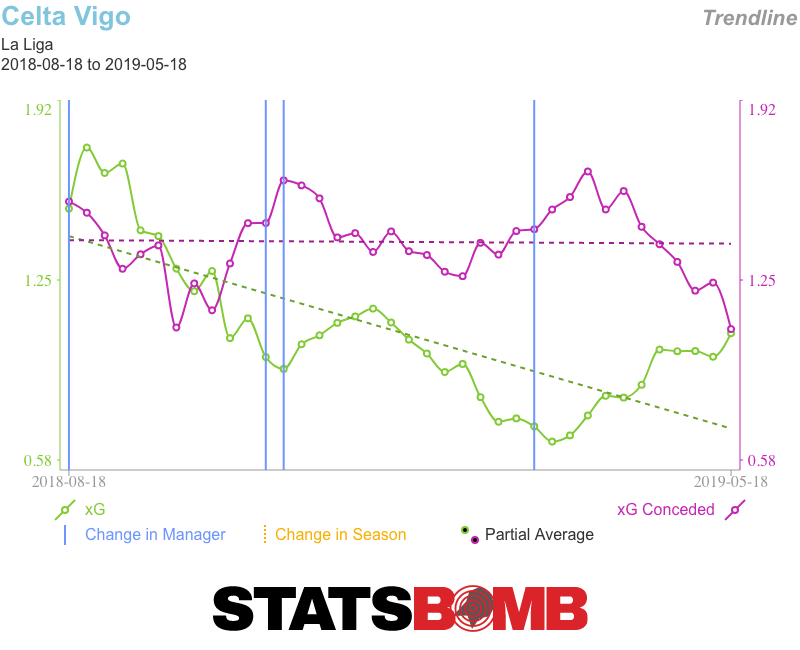 Escribá is a safe pair of hands who can be expected to continue the defensive improvement evident towards the back end of last season. But for a club whose ascension was driven by shrewd recruitment and the appointment of a series of interesting and progressive coaches, he feels like a pretty uninspiring choice. Villarreal also changed coaches twice, but the second of those changes was simply to reinstate Javi Calleja following the disastrous and very brief mid-season reign of Luis García Plaza. For two seasons now, with Calleja in charge for all but 12 of the matches, they have had pretty similar underlying numbers that have been between the 10th and 12th best in the division. In 2017-18, they converted that into fifth; last season, they flirted with relegation.
Escribá is a safe pair of hands who can be expected to continue the defensive improvement evident towards the back end of last season. But for a club whose ascension was driven by shrewd recruitment and the appointment of a series of interesting and progressive coaches, he feels like a pretty uninspiring choice. Villarreal also changed coaches twice, but the second of those changes was simply to reinstate Javi Calleja following the disastrous and very brief mid-season reign of Luis García Plaza. For two seasons now, with Calleja in charge for all but 12 of the matches, they have had pretty similar underlying numbers that have been between the 10th and 12th best in the division. In 2017-18, they converted that into fifth; last season, they flirted with relegation.  If things balance out in 2019-20 (and the team reinvest well the money raised from the sale of Pablo Fornals to West Ham, with the centre of defence an area clearly in need of strengthening) Calleja could be trusted to lead Villarreal to a solid mid-table finish. But given that they had the seventh-highest budget in La Liga last season, they might hope for a bit more.
If things balance out in 2019-20 (and the team reinvest well the money raised from the sale of Pablo Fornals to West Ham, with the centre of defence an area clearly in need of strengthening) Calleja could be trusted to lead Villarreal to a solid mid-table finish. But given that they had the seventh-highest budget in La Liga last season, they might hope for a bit more.